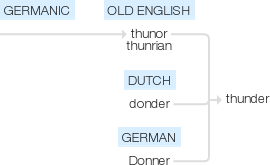Thunder
Old English thunor (noun), thunrian (verb), of Germanic origin; related to Dutch donder and German Donner (noun), from an Indo-European root shared by Latin tonare ‘to thunder’.
wiktionary
From Middle English thunder, thonder, thundre, thonre, thunnere, þunre, from Old English þunor(“thunder”), from Proto-West Germanic *þunr, from Proto-Germanic *þunraz, from Proto-Indo-European *(s)ten-, *(s)tenh₂-(“to thunder”).
Compare astound, astonish, stun. Germanic cognates include West Frisian tonger, Dutch donder, German Donner, Old Norse Þórr (English Thor), Danish torden, Norwegian Nynorsk tore. Other cognates include Persian تندر (tondar), Latin tonō, detonō, Ancient Greek στένω(sténō), στενάζω(stenázō), στόνος(stónos), Στέντωρ(Sténtōr), Irish torann, Welsh taran, Gaulish Taranis. Doublet of donner.
etymonline
thunder (n.)
mid-13c., from Old English þunor "thunder, thunderclap; the god Thor," from Proto-Germanic *thunraz (source also of Old Norse þorr, Old Frisian thuner, Middle Dutch donre, Dutch donder, Old High German donar, German Donner "thunder"), from PIE *(s)tene- "to resound, thunder" (source also of Sanskrit tanayitnuh "thundering," Persian tundar "thunder," Latin tonare "to thunder"). Swedish tordön is literally "Thor's din." The unetymological -d- also is found in Dutch and Icelandic versions of the word (compare sound (n.1)). Thunder-stick, imagined word used by primitive peoples for "gun," attested from 1904.
thunder (v.)
13c., from Old English þunrian, from the source of thunder (n.). Figurative sense of "to speak loudly, threateningly, or bombastically" is recorded from mid-14c. Related: Thundered; thundering. Compare Dutch donderen, German donnern.
